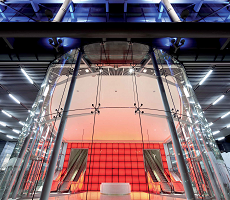July 23, 2014
Three major UK office developments get green light following months of talk

Plans for the new Astra Zeneca facility in Cambridge by Herzog & de Meuron
Three of the most talked about UK office developments have been given the go ahead within the space of a few days. The Government has finally announced that the new construction headquarters for HS2 will be in Birmingham, rather than London. Meanwhile, following all of the wrangling about its proposed takeover by Pfizer, Astra Zeneca has announced that the controversial move of its research facility from Cheshire to a new base in Cambridge will involve the creation of a new £330 million complex designed by Swiss architects Herzog & de Meuron. Finally, planning consent has been granted for the 4.9 million sq ft Wood Wharf development in docklands including nearly 2 million sq ft of office space which the developer claims will be aimed at the thriving London technology, media and telecommunications (TMT) sector.























May 7, 2014
The business of workplace design and management; new issue of Insight is now available
by Sara Bean • Comment, News, Newsletter, Workplace design